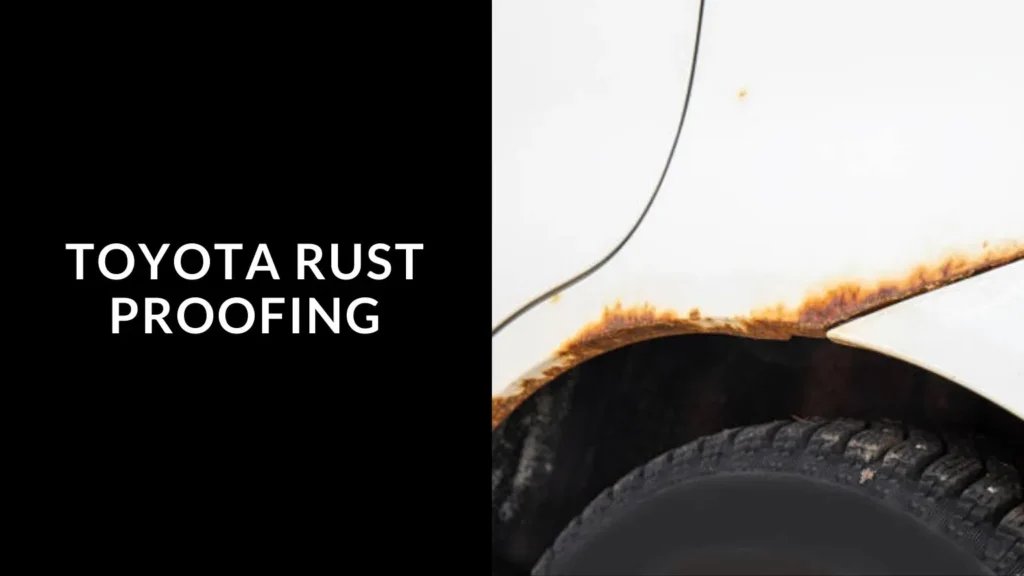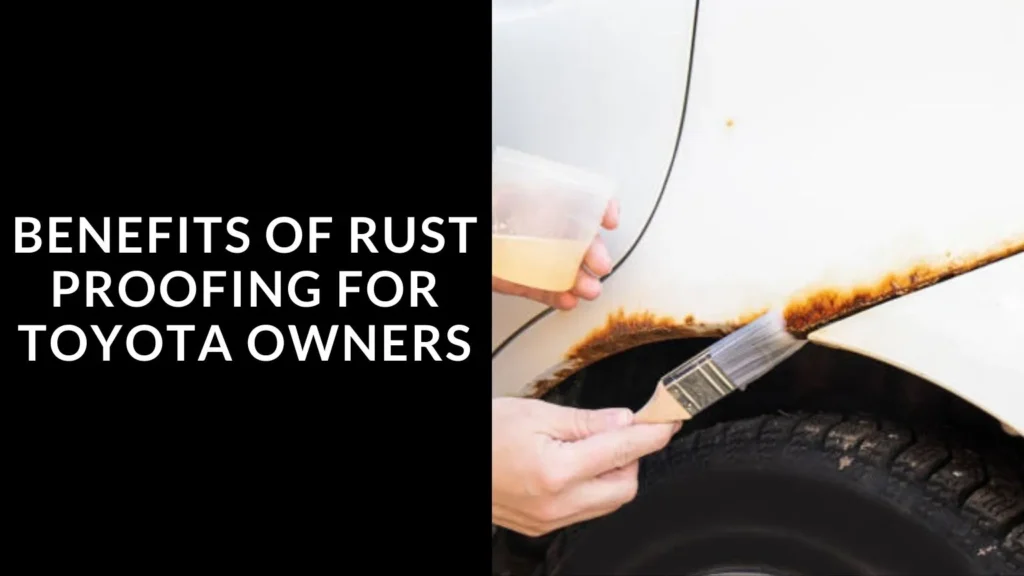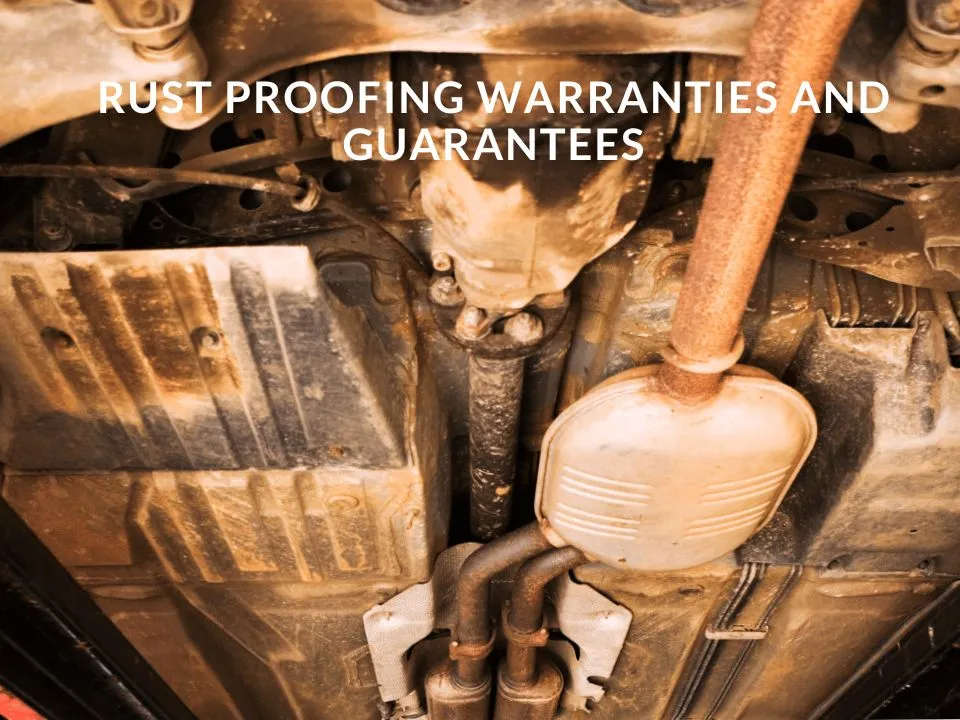In today’s world, where cars are a significant investment, ensuring their longevity and durability is paramount.
Toyota Rust Proofing, One of the most persistent challenges faced by vehicle owners, especially in regions with harsh weather conditions, is rust.
Rust not only affects the aesthetics of the vehicle but can also lead to structural damage if left untreated.
For Toyota owners, investing in rust-proofing is a proactive step toward preserving the integrity and value of their vehicles.

Understanding Rust and Its Impact
Rust, scientifically known as iron oxide, is a result of the oxidation process that occurs when iron or steel comes into contact with oxygen and moisture.
This chemical reaction weakens the metal, causing it to corrode and eventually disintegrate.
Why Rust Proofing is Important for Toyota Vehicles
Toyota vehicles, known for their reliability and durability, are not immune to rust.
Despite advancements in manufacturing processes and materials, exposure to salt, moisture, and other environmental factors can still accelerate the onset of rust.
Rust proofing acts as a protective barrier, shielding the metal components of the vehicle from corrosion and extending its lifespan.
Different Methods of Toyota Rust Proofing
There are several methods available for rust proofing Toyota vehicles, each with its own advantages and considerations.
Electronic Rust Inhibitors
Electronic rust inhibitors use low-voltage electrical currents to disrupt the oxidation process, preventing rust from forming.
While they are relatively easy to install and non-invasive, their effectiveness has been a subject of debate among experts.
Undercoating
Undercoating involves applying a protective layer of rubberized coating to the undercarriage of the vehicle.
This helps to seal out moisture and prevent rust from forming on vulnerable areas such as the frame and suspension components.
Dripless Oil Spray
Dripless oil spray involves applying a specialized oil-based solution to the vehicle’s metal surfaces.
This solution penetrates the microscopic pores of the metal, providing long-lasting protection against rust.
Wax Coating
The wax coating creates a barrier between the metal surface and external elements, preventing moisture and salt from causing corrosion. It is often used in combination with other rust proofing methods for enhanced protection.
Benefits of Rust Proofing for Toyota Owners

The benefits of rust proofing extend beyond just preserving the appearance of the vehicle.
By protecting the structural integrity of key components, rust proofing can help prevent costly repairs and maintenance down the line.
Additionally, it can increase the resale value of the vehicle and provide peace of mind to the owner.
When Should You Consider Rust Proofing Your Toyota?
Ideally, rust proofing should be done as soon as possible after purchasing a new Toyota vehicle.
However, it is never too late to invest in rust proofing, especially if the vehicle has been exposed to harsh environmental conditions or is showing signs of corrosion.
DIY vs. Professional Rust Proofing
While some DIY rust proofing kits are available on the market, professional rust proofing services offer expertise and specialized equipment that ensure thorough and effective protection.
It is recommended to consult with a professional to determine the best rust proofing method for your Toyota vehicle.
Cost Considerations for Rust Proofing
The cost of rust proofing ($699) can vary depending on the method chosen, the size of the vehicle, and the provider.
However, when compared to the potential cost of repairing rust damage, the investment in rustproofing is relatively modest and well worth it in the long run.
How Often Should You Rust Proof Your Toyota?
The frequency of rust-proofing largely depends on the method used and environmental factors. Generally, it is recommended to reapply rust proofing every one to two years for optimal protection.
Common Misconceptions About Rust Proofing
There are several misconceptions surrounding rust proofing, such as it being unnecessary for newer vehicles or only applicable to certain parts of the vehicle.
However, the reality is that rust can affect any vehicle regardless of age or model, and comprehensive rust proofing is essential for long-term preservation.
Tips for Maintaining Rust Proofing
To ensure the effectiveness of rust proofing, it is important to regularly inspect the vehicle for any signs of damage or corrosion and address them promptly.
Additionally, washing the vehicle regularly and avoiding exposure to harsh chemicals can help maintain the integrity of the protective coating.
Here are some tips to help you maintain rust proofing:
Regular Inspections: Schedule regular inspections of your vehicle to check for any signs of damage or corrosion. Look for areas where the rust proofing may have worn off or been compromised.
Prompt Repairs: If you notice any areas where the rust proofing has been damaged or compromised, take immediate action to repair them. This may involve reapplying rust proofing solution or addressing any underlying issues that may have caused the damage.
Regular Cleaning: Wash your vehicle regularly to remove dirt, grime, and road salt that can contribute to corrosion. Pay special attention to the undercarriage and other areas prone to rust.
Avoid Harsh Chemicals: When cleaning your vehicle, avoid using harsh chemicals or abrasive cleaners that can strip away the protective coating. Opt for gentle, pH-balanced car wash products instead.
Avoid Environmental Hazards: Try to avoid exposing your vehicle to environmental hazards such as saltwater, harsh chemicals, and extreme temperatures whenever possible. If driving in salt-laden areas during winter, consider washing your vehicle more frequently to remove salt buildup.
Touch-up as Needed: Periodically inspect the rust proofing coating and touch up any areas where it may have worn off or become damaged. This will help maintain consistent protection across all surfaces of your vehicle.
Professional Inspection: Consider scheduling periodic inspections with a professional rust proofing service to assess the condition of your vehicle’s rust protection and address any potential issues proactively.
Follow Manufacturer Recommendations: Follow any specific recommendations or guidelines provided by the manufacturer or rust proofing service regarding maintenance and reapplication intervals.
Rust Proofing Warranties and Guarantees

When choosing a rust proofing service, it is advisable to inquire about any warranties or guarantees offered.
This provides added assurance and peace of mind knowing that the investment is protected against unforeseen issues.
Environmental Impact of Rust Proofing Methods
While rust proofing is essential for vehicle preservation, it is important to consider its environmental impact.
Some rust proofing methods may involve the use of chemicals that can be harmful to the environment if not disposed of properly.
Opting for eco-friendly rust proofing solutions can help minimize the carbon footprint.
Customer Reviews and Experiences with Rust Proofing
Reading reviews and testimonials from other Toyota owners who have invested in rust proofing can provide valuable insights and help make an informed decision.
Hearing about real-life experiences and outcomes can give confidence in the effectiveness of rust proofing.
People also ask
Do Toyotas need rust proofing?
Yes, Toyotas can benefit from rust proofing, especially in regions with harsh weather conditions or exposure to road salt.
Rust proofing helps protect the vehicle’s metal components from corrosion, preserving its longevity and appearance.
How do you prevent rust on a Toyota?
To prevent rust on a Toyota, regular maintenance and rust proofing are key.
This includes washing the vehicle regularly, applying rust proofing treatments, and addressing any signs of damage promptly.
How long does Toyota undercoating last?
The longevity of Toyota undercoating varies depending on factors such as environmental conditions, driving habits, and the quality of the undercoating applied.
Generally, undercoating can last anywhere from one to several years before needing reapplication.
Regular inspections and maintenance can help determine when reapplication is necessary.
Is dealership rust proofing worth it?
Dealership rust proofing can be worth it for some buyers, as it may offer convenience and peace of mind.
However, it’s essential to consider factors like cost, effectiveness, and whether similar services are available elsewhere.
Researching the specific methods used and comparing prices with independent providers can help make an informed decision.
Conclusion
In Conclusion, Rust proofing is not just a cosmetic enhancement; it is a proactive measure to protect your Toyota vehicle against the damaging effects of corrosion.
By investing in rust proofing, Toyota owners can ensure their vehicles remain in pristine condition for years to come, preserving their value and performance.